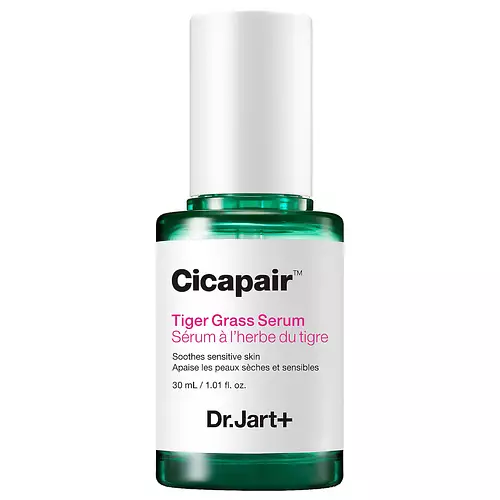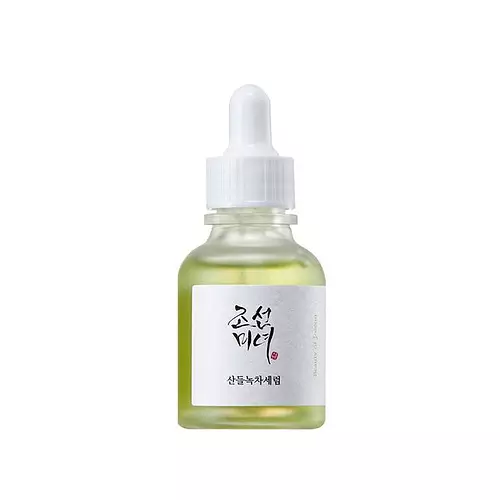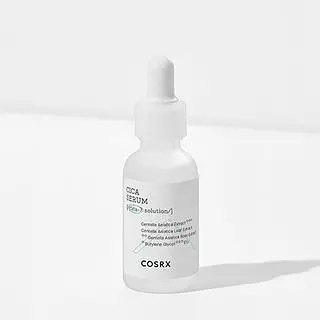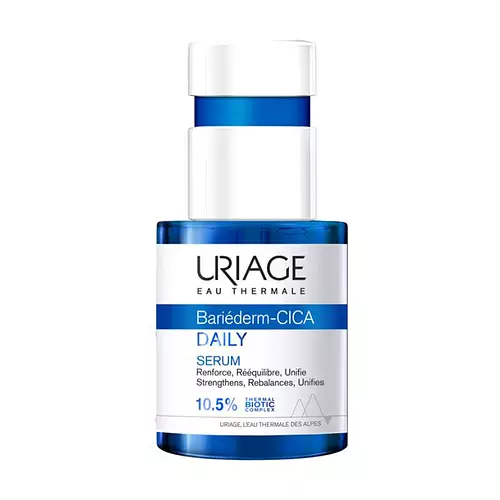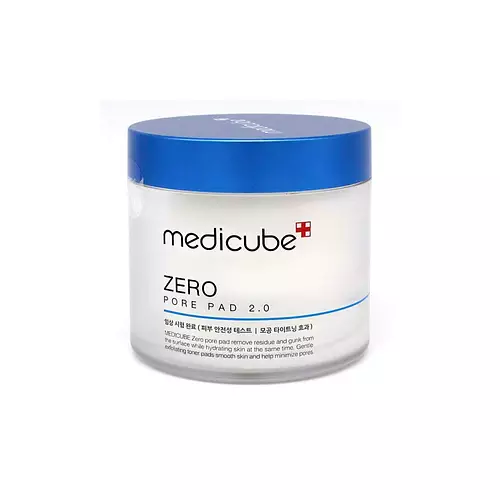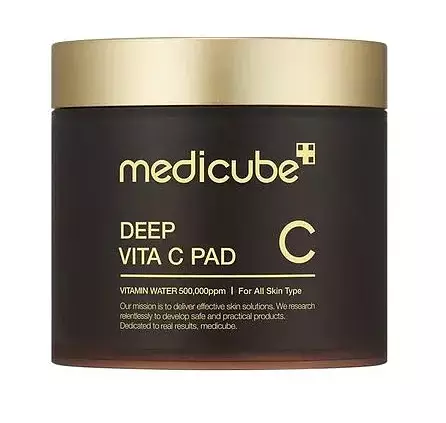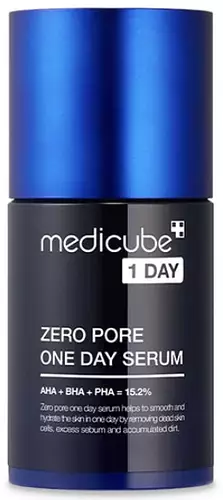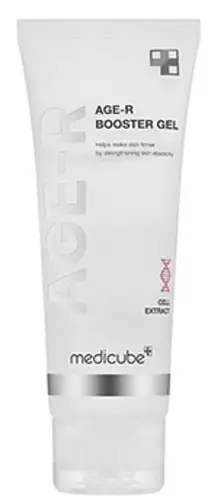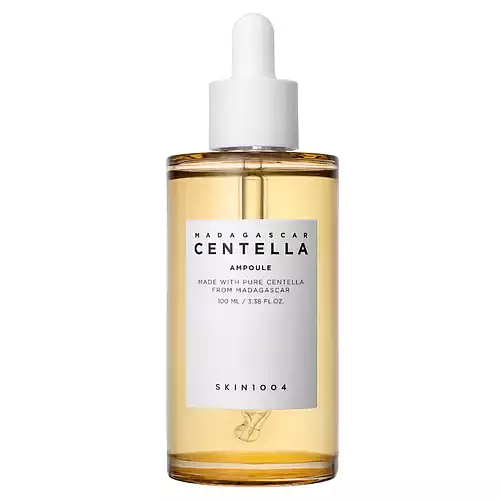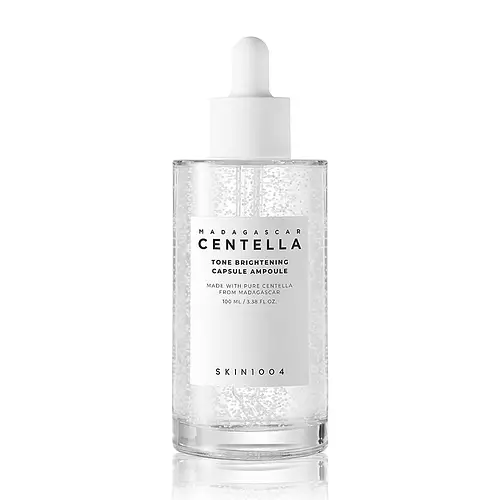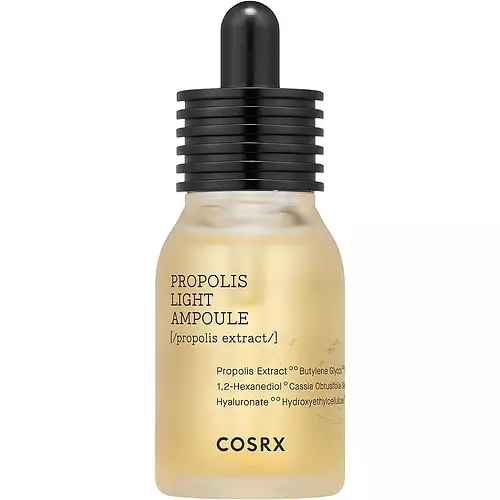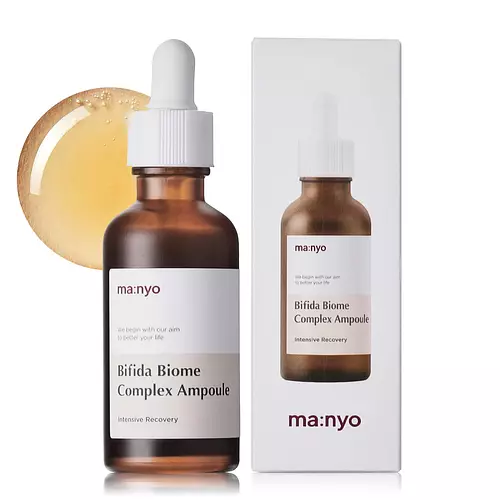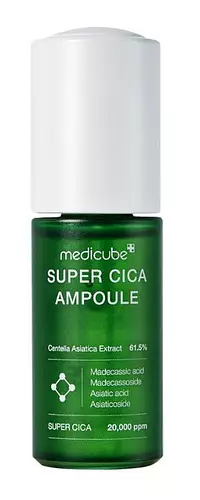
MediCube Super Cica Ampoule Ingredients Explained
Published on December 27, 2021 Submitted by saleskim91
Overview
What it is
Ampoule with 34 ingredients
Cool Features
It is cruelty-free and reef safe
Suited For
It has ingredients that are good for anti aging, dry skin, brightening skin, sensitive skin, oily skin, scar healing and dark spots
Free From
It doesn't contain any harsh alcohols, common allergens, oils, parabens, silicones or sulfates
Fun facts
MediCube is from South Korea. This product is used in 3 routines created by our community.
We independently verify ingredients and our claims are backed by peer-reviewed research. Does this product need an update? Let us know.
Ampoule with 34 ingredients
Quick info
You should know
Benefits
This product contains 2 ingredients that may have this attribute:
This product contains 6 ingredients that may have this attribute:
This product contains 6 ingredients that may have this attribute:
This product contains 1 ingredient that may have this attribute:
This product contains 1 ingredient that may have this attribute:
This product contains 1 ingredient that may have this attribute:
Ingredients 34
Centella Asiatica Extract (Cica) is derived from an herb native to Southeast Asia. It is famous for its anti-inflammatory and soothing properties.
Water. It's the most common cosmetic ingredient of all. You'll usually see it at the top of ingredient lists, meaning that it makes up the largest part of the product.
Glycerin is already naturally found in your skin. It helps moisturize and protect your skin.
Butylene Glycol (or BG) is used within cosmetic products for a few different reasons:
Glycereth-26 is a synthetic ingredient and polyethylene glycol ether of Glycerin. Glycerin is already naturally found in your skin and helps keep your skin moisturized.
1,2-Hexanediol is a multi-tasker ingredient. It acts as a preservative to increase shelf-life and can aid other preservatives in preventing microbe growth. 1,2-Hexanediol also helps the skin retain moisture as a humectant.
Betaine is a common humectant (a substance that promotes retention of moisture). It's known to be gentle on the skin and can help balance hydration.
Glycyrrhiza Uralensis is also known as the Chinese licorice plant. Chinese licorice root contains antioxidants and polysaccharides.
Carbomer is a polymer of acrylic acid. Its main role is to create gel consistency within products.
Tromethamine is an aliphatic compound. An aliphatic compound is an organic compound with open-chained carbon atoms. It is synthetically created. Tromethamine is used to balance pH and improve texture.
Glycereth-25 PCA Isostearate isn't fungal acne safe.
Ethylhexylglycerin (we can't pronounce this either) is commonly used as a preservative and skin softener. It is derived from glyceryl.
Allantoin plays a role in soothing and moisturizing the skin. Because of this, it is often added to products with strong active ingredients.
Glyceryl Acrylate/Acrylic Acid Copolymer is made up of glycerin and polyacrylic acid. It helps hydrate your skin as a humectant.
Dipropylene Glycol is a synthetically created stabilizer and solvent. It is a part of the glycol class in the alcohol family.
Panthenol (also referred to as pro-vitamin B5) is a common ingredient that helps hydrate and soothe the skin.
Adenosine is in every living organism. It is one of four components in nucleic acids that helps store our DNA.
Propanediol helps absorb ingredients into your skin, boosting their benefits. It can act as an emollient, making your skin softer. Propanediol can help products last longer by boosting the properties of preservatives within the formulation.
Centella Asiatica Root Extract can help to reduce redness.
Centella Asiatica Leaf Extract comes from the leaves of an herb plant native to Southeast Asia. Centella Asiatica is rich in antioxidants and amino acids. It can help reduce irritation and soothe the skin.
Pentylene glycol is typically used within a product to thicken it. It also adds a smooth, soft, and moisturizing feel to the product. It is naturally found in plants such as sugar beets.
This ingredient is created by distilling parts of the tea tree plant. The bark and leaves of the tea tree plant are rich in Terpinen, an antioxidant, antibacterial, and anti-inflammatory ingredient.
Madecassoside comes from the super popular skin-soothing ingredient, Centella asiatica. It is one of four active compounds found in the extract of Centella Asiatica.
Biosaccharide Gum-1 is a sugar created from fermented sorbitol. Most sorbitol is made from potato starch.
Melaleuca Alternifolia Leaf Extract comes from the Tea Tree, Melaleuca alternifolia, Myrtaceae. This tea tree is native to Australia.
Asiatic Acid is a major component of Centella Asiatica Extract. It has wound-healing, anti-inflammatory, and antioxidant properties.
Madecassic Acid is a major component of Centella Asiatica Extract. It has anti-inflammatory and antioxidant properties.
Asiaticoside comes from the super popular skin-soothing ingredient, Centella asiatica. It is one of four active compounds found in the extract of Centella Asiatica.
Ectoin is a compound found naturally in some species of bacteria. It can be synthetically created for skincare use.
Centella Asiatica Extract, Water, Glycerin, Butylene Glycol, Methylpropanediol, Glycereth-26, 1,2-Hexanediol, Betaine, Glycyrrhiza Uralensis Extract, Carbomer, Tromethamine, Glycereth-25 PCA Isostearate, Ethylhexylglycerin, Dipotassium Glycyrrhizate, Allantoin, Glyceryl Acrylate/Acrylic Acid Copolymer, Dipropylene Glycol, Panthenol, Gardenia Florida Fruit Extract, Adenosine, Propanediol, Polyglyceryl-10 Oleate, Centella Asiatica Root Extract, Centella Asiatica Leaf Extract, Coptis Japonica Extract, Pentylene Glycol, Melaleuca Alternifolia Leaf Water, Madecassoside, Biosaccharide Gum-1, Melaleuca Alternifolia Leaf Extract, Asiatic Acid, Madecassic Acid, Asiaticoside, Ectoin
Ingredient Ratings
Based on the number of likes and dislikes each ingredient has received.
Ingredients Explained
Centella Asiatica Extract (Cica) is derived from an herb native to Southeast Asia. It is famous for its anti-inflammatory and soothing properties.
Cica is rich in antioxidants and amino acids, such as Madecassic Acid and Asiaticoside.
Studies show the compounds in cica help with:
The combination of all these properties makes cica effective at soothing, hydrating, and protecting the skin.
Other great components of Cica include Vitamin A, vitamin C, several B vitamins, and Asiatic Acid.
Fun fact: Cica has been used as a medicine and in food for many centuries. As a medicine, it is used to treat burns, scratches, and wounds.
Learn more about Centella Asiatica ExtractWater. It's the most common cosmetic ingredient of all. You'll usually see it at the top of ingredient lists, meaning that it makes up the largest part of the product.
So why is it so popular? Water most often acts as a solvent - this means that it helps dissolve other ingredients into the formulation.
You'll also recognize water as that liquid we all need to stay alive. Talk about multi-purpose! If you see this, drink a glass of water. Stay hydrated!
Learn more about WaterGlycerin is already naturally found in your skin. It helps moisturize and protect your skin.
A study from 2016 found glycerin to be more effective as a humectant than AHAs and hyaluronic acid.
As a humectant, it helps the skin stay hydrated by pulling moisture to your skin. The low molecular weight of glycerin allows it to pull moisture into the deeper layers of your skin.
Hydrated skin improves your skin barrier; Your skin barrier helps protect against irritants and bacteria.
Glycerin has also been found to have antimicrobial and antiviral properties. Due to these properties, glycerin is often used in wound and burn treatments.
In cosmetics, glycerin is usually derived from plants such as soybean or palm. However, it can also be sourced from animals, such as tallow or animal fat.
This ingredient is organic, colorless, odorless, and non-toxic.
Glycerin is the name for this ingredient in American English. British English uses Glycerol/Glycerine.
Learn more about GlycerinButylene Glycol (or BG) is used within cosmetic products for a few different reasons:
- It is a solvent, meaning that it helps to dissolve other ingredients. This also enhances the absorption of the product into one's skin.
- It is a humectant, which means that it helps attract moisture into the skin.
- It helps improve product application.
Overall, Butylene Glycol is a safe and well-rounded ingredient. It is unlikely to irritate skin, and works well with pretty much all other ingredients.
Methylpropanediol is a synthetic solvent and humectant.
As a solvent, it helps dissolve other ingredients, helping to evenly distribute ingredients throughout the product. This ingredient has also been shown to have antimicrobial properties which makes it a preservative booster.
Methylpropanediol is able to add a bit of moisture to the skin. It also helps other ingredients be better absorbed into the skin, such as salicylic acid.
Learn more about MethylpropanediolGlycereth-26 is a synthetic ingredient and polyethylene glycol ether of Glycerin. Glycerin is already naturally found in your skin and helps keep your skin moisturized.
It is a humectant and helps add texture to products. It can make your product thicker.
As a humectant, it helps draw moisture from the air to your skin. This helps your skin stay hydrated.
Learn more about Glycereth-261,2-Hexanediol is a multi-tasker ingredient. It acts as a preservative to increase shelf-life and can aid other preservatives in preventing microbe growth. 1,2-Hexanediol also helps the skin retain moisture as a humectant.
In products that are water-based, this ingredient can help stabilize perfumes and fragrances. It can also help make the texture of products softer and more smooth.
Betaine is a common humectant (a substance that promotes retention of moisture). It's known to be gentle on the skin and can help balance hydration.
Betaine is best for improving hydration and soothing irritated skin. Studies show betaine may help with uneven skin tones.
Betaine is naturally created in the skin and body. The form found within cosmetic products can be either plant-dervied or synthetic.
Learn more about BetaineGlycyrrhiza Uralensis is also known as the Chinese licorice plant. Chinese licorice root contains antioxidants and polysaccharides.
Antioxidants may help with anti-aging by neutralizing free-radical molecules. Polysaccharides help moisturize the skin due to their ability to mimic our natural skin barrier.
Carbomer is a polymer of acrylic acid. Its main role is to create gel consistency within products.
Carbomer is commonly found in many types of cosmetics products. It is found to be safe in concentrations up to 15%. However, a high amount of carbomer can cause pilling or balling up of products. Most products contain 1% of less of carbomer.
Tromethamine is an aliphatic compound. An aliphatic compound is an organic compound with open-chained carbon atoms. It is synthetically created. Tromethamine is used to balance pH and improve texture.
As an emulsifier, Tromethamine prevents oil and water ingredients from separating. This helps stabilize the product and elongate a product's shelf life. Tromethamine also makes a product thicker.
Tromethamine helps balance the pH level of a product. Normal pH level of skin is slightly acidic (~4.75-5.5). The acidity of our skin is maintained by our glands and skin biome. Being slightly acidic allows our skin to create an "acid mantle". This acid mantle is a thin barrier that protects our skin from bacteria and contaminants.
Oral Tromethanmine is an anti-inflammatory drug but plays the role of masking, adding fragrance, and/or balancing pH in skincare.
1,3-Propanediol, 2-amino-2-(hydroxymethyl)-
Learn more about TromethamineGlycereth-25 PCA Isostearate isn't fungal acne safe.
Ethylhexylglycerin (we can't pronounce this either) is commonly used as a preservative and skin softener. It is derived from glyceryl.
You might see Ethylhexylglycerin often paired with other preservatives such as phenoxyethanol. Ethylhexylglycerin has been found to increase the effectiveness of these other preservatives.
Dipotassium Glycyrrhizate comes from licorice root.
Extracts of licorice have demonstrated to have antibacterial, anti‐inflammatory, antiviral, antioxidant properties.
One component, glabridin, has extra potent antioxidant and soothing properties. It has also been found to block pigmentation from UVB rays in guinea pigs.
Licorice Root also contains a flavonoid. Flavonoids are a natural substance from in plants. Flavonoids also have antioxidant properties.
Another component, glycyrrhizin, has been found to have anti-inflammatory and antimicrobial benefits. This may make licorice root extract effective at treating acne. However, more research is needed to support this.
Liquiritin is one of the flavone compounds found in licorice. It has been found to help lighten skin by preventing tyrosinase from reacting with tyrosine. When the two react, protein is converted to melanin. Melanin is the substance in your body that gives your features pigmentation.
Licorice root is native to Southern Europe and Asia. It has been used in traditional Chinese medicine to help with respiratory issues.
Learn more about Dipotassium GlycyrrhizateAllantoin plays a role in soothing and moisturizing the skin. Because of this, it is often added to products with strong active ingredients.
Some studies have shown this ingredient can promote wound healing with higher concentrations.
Allantoin is derived from the comfrey plant but produced synthetically for cosmetic products to ensure purity.
Learn more about AllantoinGlyceryl Acrylate/Acrylic Acid Copolymer is made up of glycerin and polyacrylic acid. It helps hydrate your skin as a humectant.
Humectants draw moisture from the air to your skin.
Dipropylene Glycol is a synthetically created stabilizer and solvent. It is a part of the glycol class in the alcohol family.
Dipropylene Glycol helps dissolve and evenly distribute ingredients. It also helps decrease viscosity and thin out texture.
As a masking agent, Dipropylene Glycol can be used to cover the smell of other ingredients. However, it does not have a scent.
Studies show Dipropylene Glycol is considered safe to use in skincare.
Learn more about Dipropylene GlycolPanthenol (also referred to as pro-vitamin B5) is a common ingredient that helps hydrate and soothe the skin.
lt is a humectant, meaning that it helps the skin attract and retain moisture.
Another benefit is the anti-inflammatory abilities. This means that it's great for sensitive, irritation-prone skin.
Once oxidized, panthenol converts to pantothenic acid. Panthothenic acid is found in all living cells.
Learn more about PanthenolWe don't have a description for Gardenia Florida Fruit Extract.
Adenosine is in every living organism. It is one of four components in nucleic acids that helps store our DNA.
Adenosine has many benefits when used. These benefits include hydrating the skin, smoothing skin, and reducing wrinkles. Once applied, adenosine increases collagen production. It also helps with improving firmness and tissue repair.
Studies have found adenosine may also help with wound healing.
In skincare products, Adenosine is usually derived from yeast.
Learn more about AdenosinePropanediol helps absorb ingredients into your skin, boosting their benefits. It can act as an emollient, making your skin softer. Propanediol can help products last longer by boosting the properties of preservatives within the formulation.
Propanediol is not likely to cause sensitivity and considered safe to use.
It is derived from corn or petroleum with a clear color and no scent.
Learn more about PropanediolPolyglyceryl-10 Oleate isn't fungal acne safe.
Centella Asiatica Root Extract can help to reduce redness.
Centella Asiatica Leaf Extract comes from the leaves of an herb plant native to Southeast Asia. Centella Asiatica is rich in antioxidants and amino acids. It can help reduce irritation and soothe the skin.
Many active components found in centella asiatica, such as Madecassic Acid and Asiaticoside, encourage the skin to naturally produce hyaluronic acid. This helps keep our skin hydrated. Many of these components also show antioxidant activity and may help reduce the signs of aging.
Research shows centella asiatica can help increase Type I collagen production by increasing fibroblast production. Fibroblast helps form connective tissue.
The combination of all these properties makes centella asiatica leaf extract effective at soothing the skin.
Other components of centella asiatica leaf extract include Vitamin A, vitamin C, several B vitamins, and Asiatic Acid.
Recent studies found madecassoside may help prevent damage from UV rays by preventing UV-induced inflammation. Further research is needed.
This plant has been used as a medicine and in food for many centuries. As a medicine, it is used to treat burns, scratches, and wounds.
Learn more about Centella Asiatica Leaf ExtractWe don't have a description for Coptis Japonica Extract.
Pentylene glycol is typically used within a product to thicken it. It also adds a smooth, soft, and moisturizing feel to the product. It is naturally found in plants such as sugar beets.
The hydrophilic trait of Pentylene Glycol makes it a humectant. As a humectant, Pentylene Glycol helps draw moisture from the air to your skin. This can help keep your skin hydrated.
This property also makes Pentylene Glycol a great texture enhancer. It can help thicken or emulsify a product. Emulsifiers help stabilize a product. It does this by preventing certain ingredients from separating.
Pentylene Glycol also acts as a mild preservative and helps to keep a product microbe-free.
Some people may experience mild eye and skin irritation from Pentylene Glycol. We always recommend speaking with a professional about using this ingredient in your routine.
Pentylene Glycol has a low molecular weight and is part of the 1,2-glycol family.
Learn more about Pentylene GlycolThis ingredient is created by distilling parts of the tea tree plant. The bark and leaves of the tea tree plant are rich in Terpinen, an antioxidant, antibacterial, and anti-inflammatory ingredient.
Learn more about tea tree benefits here.
Madecassoside comes from the super popular skin-soothing ingredient, Centella asiatica. It is one of four active compounds found in the extract of Centella Asiatica.
Madecassoside has antioxidant, anti-inflammatory, and hydrating properties. It contains fatty acids, amino acids, beta-carotene, and phytochemicals.
One study found using Madecassoside with ascorbic acid helped reduce the signs of aging and improved skin hydration.
Learn more about MadecassosideBiosaccharide Gum-1 is a sugar created from fermented sorbitol. Most sorbitol is made from potato starch.
This ingredient is a a skin conditioning ingredient and helps moisturize the skin.
It is also naturally found in fruits such as apples and pears.
Learn more about Biosaccharide Gum-1Melaleuca Alternifolia Leaf Extract comes from the Tea Tree, Melaleuca alternifolia, Myrtaceae. This tea tree is native to Australia.
Tea Leaf extract contains antimicrobial and anti-acne properties.
Tea tree extract is fragrant and contains volatiles such as linalool and limonene. These fragrance and terpinen components can cause skin sensitivity.
Learn more about the benefits of Tea Tree Oil here.
Learn more about Melaleuca Alternifolia Leaf ExtractAsiatic Acid is a major component of Centella Asiatica Extract. It has wound-healing, anti-inflammatory, and antioxidant properties.
Studies show Asiatic Acid is able to block the pathway for skin inflammation receptors, helping to soothe skin.
As an antioxidant, asiatic acid helps protect our skin against damaging environmental factors.
Learn more about Asiatic AcidMadecassic Acid is a major component of Centella Asiatica Extract. It has anti-inflammatory and antioxidant properties.
It is a triterpenoid, meaning it naturally acts as an antioxidant. Antioxidants protect your skin against damage from environmental factors such as pollution and UV.
Studies show Madecassic Acid helps soothe the skin due to its ability to block inflammation pathways.
Learn more about Madecassic AcidAsiaticoside comes from the super popular skin-soothing ingredient, Centella asiatica. It is one of four active compounds found in the extract of Centella Asiatica.
Asiaticoside is an antioxidant and helps with wound healing. It has been shown to increase antioxidant activity during the wound healing process.
Ectoin is a compound found naturally in some species of bacteria. It can be synthetically created for skincare use.
This ingredient is an osmolyte; Osmolytes help organisms survive osmotic shock (it protects them from extreme conditions). It does this by influencing the properties of biological fluids within cells.
When applied to the skin, ectoin helps bind water molecules to protect our skin. The water forms a sort of armor for the parts of our skin cells, enzymes, proteins, and more.
Besides this, ectoin has many uses in skincare:
A study from 2004 found ectoin to counteract the damage from UV-A exposure at different cell levels. It has also been shown to protect skin against both UV-A, UV-B rays, infrared light, and visible light.
Studies show ectoin to have dual-action pollution protection: first, it protects our skin from further pollution damage. Second, it helps repair damage from pollution.
In fact, ectoin has been shown to help with:
Fun fact: In the EU, ectoin is used in inhalation medication as an anti-pollution ingredient.
Ectoin is a highly stable ingredient. It has a wide pH range of 1-9. Light, oxygen, and temperature do not affect this ingredient.
Learn more about EctoinWhen to use
How this product is used by our community
Compared With
Here are some products that it's often compared with
More MediCube Products
See all MediCube productsMore Ampoules
See all ampoulesWe're dedicated to providing you with the most up-to-date and science-backed ingredient info out there.
The data we've presented on this page has been verified by a member of the SkinSort Team.
Read more about us

